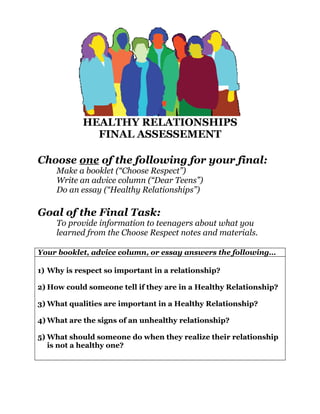Notes On Choose Respect Materials
- 1. HEALTHY RELATIONSHIPS FINAL ASSESSEMENT Choose one of the following for your final: Make a booklet (“Choose Respect”) Write an advice column (“Dear Teens”) Do an essay (“Healthy Relationships”) Goal of the Final Task: To provide information to teenagers about what you learned from the Choose Respect notes and materials. Your booklet, advice column, or essay answers the following… 1) Why is respect so important in a relationship? 2) How could someone tell if they are in a Healthy Relationship? 3) What qualities are important in a Healthy Relationship? 4) What are the signs of an unhealthy relationship? 5) What should someone do when they realize their relationship is not a healthy one?
- 2. CHOOSE RESPECT NOTES “If you give respect, you get respect.” Question #1: Why is respect so important in a relationship? MATERIALS: AM I IN A HEALTHY RELATIONSHIP? Respect in a relationship means that each person values who the other is and understands — and would never challenge — the other person's boundaries. MATERIALS: HEALTHY RELATIONSHIPS In healthy relationships, people respect each other for who they are. This includes respecting and listening to yourself and your feelings so you can set boundaries and feel comfortable. MATERIALS: THE RELATIONSHIP SPECTRUM You value each other as you are. Culture, beliefs, opinions and boundaries are valued. You treat each other in a way that demonstrates the high esteem you hold for one another. MATERIALS: BE A GOOD ROLE MODEL You acknowledge how great the other person is. Mistakes are accepted and learned from. Boundaries are respected. Question #2: How could someone tell if they are in a Healthy Relationship? MATERIALS: HEALTHY RELATIONSHIPS & AM I IN A HEALTHY RELATIONSHIP? Communication, trust, honesty, fairness/equality, and respect are the key ingredients for healthy relationships. Question #3: What qualities are important in a Healthy Relationship? MATERIALS: GREEN LIGHT SIGNS Talk to each other Have freedom within the relationship Trust each other Have more good times than bad Support each other Have fun together Feel happy around the person Do things together
- 3. Share feelings Encourage other friendships CHOOSE RESPECT NOTES MATERIALS: HEALTHY RELATIONSHIPS Healthy relationships are fun and make you feel good about yourself. You know that you are in a healthy relationship with someone because you feel good about yourself when you are around that person. Healthy peer relationships involve an equal amount of give and take in the relationship. You should feel safe around the other person and feel that you can trust him/her with your secrets. In a healthy relationship, you like to spend time with the other person, instead of feeling like you're pressured into spending time with them. You know if you have a healthy relationship when… You feel good about yourself when you are with that person. You think that both people work hard to treat the other person well. You feel safe around the other person. You like being with the other person. You feel that you can trust him or her with your secrets. Question #4: What are the signs of an unhealthy relationship? MATERIALS: UNHEALTHY RELATIONSHIPS Unhealthy relationships can make you feel sad, angry, scared, or worried. In unhealthy relationships, there is an unfair balance. You may feel that most of the time you are giving the other person more attention than they give to you. Unhealthy relationships do not include trust and respect, which are very important parts of a family relationship, good friendship, or dating relationship. No one deserves to be in an unhealthy relationship. MATERIALS: SAFETY TIPS Recognize the early warning signs of potential physical violence, like extreme jealousy, controlling behavior, or verbal threats. MATERIALS: SAFETY IN RELATIONSHIPS: A GUIDE FOR TEENS
- 4. Take a look at this list of warning signs and see if these statements describe your relationship… CHOOSE RESPECT NOTES MATERIALS: THE WARNING SIGNS Is jealous or possessive of you—he or she gets Swears at you or uses mean language angry when you talk or hang out with other friends or people of the opposite sex Bosses you around, makes all the decisions, Blames you for his or her problems, tells you tells you what to do that it is your fault that he or she hurt you Tells you what to wear, who to talk to, where Insults you or embarrasses you in front of you can go other people Is violent to other people, gets in fights a lot, Has physically hurt you loses his/her temper a lot Pressures you to do something that you don't Makes you feel scared of their reactions to want to do things Uses drugs and alcohol and tries to pressure Calls to check up on you all the time and wants you into doing the same thing to always know where you are going and who you are with Question #5: What should someone do when they realize they are not in a Healthy Relationship? MATERIALS: THE EQUALITY WHEEL These safety tips are for all persons involved in relationships, and are helpful for adolescents as well as adults... If you are the victim of relationship abuse, don't blame yourself but do seek help: If you are in immediate danger, Contact 9-1-1 for help. Talk with people you trust and seek services. Contact your local domestic violence shelter or the National Domestic Violence Hotline at 1-800-799-SAFE (7233), or www.ndvh.org. You can also contact the National Sexual Assault Hotline 1-800-656-HOPE (4673), National Sexual Violence Resource Center www.nsvrc.org, National Youth Violence Prevention Resource Center www.safeyouth.org or Love Is Not Abuse at www.loveisnotabuse.com for helpful information and advice. If you are or think you may become violent with the person you are dating, Contact the National Domestic Violence Hotline at 1-800-799-SAFE (7233), www.ndvh.org or the National Sexual Assault Hotline 1-800-656-HOPE (4673).
- 5. For more information about CDC's work in injury and violence prevention, go to: www.cdc.gov/injury, cdcinfo@cdc.gov, 1-800-CDC-INFO, (1-800-232-4636).

